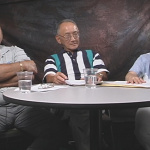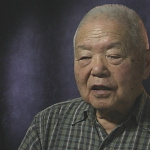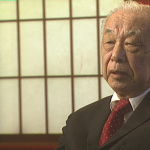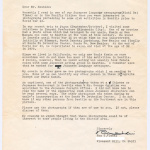Togo Tanaka
| Name | Togo Tanaka |
|---|---|
| Born | January 7 1916 |
| Died | May 21 2009 |
| Birth Location | Portland, OR |
| Generational Identifier |
Newspaper editor, documentary historian, and businessman. An influential English language editor of the Rafu Shimpo newspaper, Togo Tanaka (1916–2009) was one of the leading voices of the Nisei generation before the war. Incarcerated at Manzanar , he helped to chronicle the incarceration for both the federal government and for a University of California research project. He became a successful publisher and real estate investor after the war.
Nisei Leader
Togo Tanaka was born in January 7, 1916, in Portland, Oregon, the fifth of six children of Issei parents who had migrated from Yamaguchi prefecture. The family moved to Los Angeles when Togo was an infant, and he grew up in a largely middle-class and white community in Hollywood. His parents ran a vegetable market. A bright student, he graduated from Hollywood High at age sixteen and went on to UCLA, graduating Phi Beta Kappa in 1936 with a degree in political science. He wrote for the Daily Bruin newspaper at UCLA and also was associate editor of the Kashu Mainichi English section while a student.
As was the case for many bright Nisei college graduates at that time, positions in mainstream organizations or civil service were largely off limits due to racial discrimination, and Tanaka took a job as co-editor of the English section of the Rafu Shimpo , one of the most widely read of the Japanese language newspapers. Like many Nisei leaders, he saw a role for Nisei as a bridge of understanding between Japan and the U.S. through "our world friendship club gathering, our cosmopolitan associations, our international institute discussions, our church forums, our America-Japan student conferences." [1] The Rafu Shimpo' s English section also promoted the Japanese perspective on the conflict in China, blaming American support for China on "Chinese propaganda." But as this position became increasingly untenable in the late 1930s, Tanaka and the English section eventually split from the Japanese section to promote a 100% American viewpoint. Tanaka also joined the fledgling Japanese American Citizens League (JACL), holding a national office in charge of publicity. [2] In October of 1941, he was sent by Rafu publisher H. T. Komai to Washington DC to find out how the paper might continue to publish during the war, meeting with Attorney General Francis Biddle and first lady Eleanor Roosevelt . [3]
Manzanar Chronicler
After the Japanese attack on Pearl Harbor on December 7, 1941, Tanaka was among those arrested and interned immediately afterwards, one of the very few Nisei among that group of mostly Issei community leaders. He was held in various prisons around the Los Angeles area. His pregnant wife Jean did not know his whereabouts, and he was not allowed to call her. He was suddenly released after eleven days. Returning to work, he struggled to keep the newspaper afloat, with its Issei leadership interned and with 1,000 canceled subscriptions from a panicked population.
He also tried to organize community response to the crisis. On February 19, 1942, he presided over a mass meeting of the United Citizens Federation at the Maryknoll Catholic Mission, attended by an estimated 1,500. The group was a coalition of some twenty-one Nisei groups in Los Angeles and Tanaka was among those trying to build a pan-Nisei organization. Later, during the " voluntary evacuation " period, he was part of a group investigating alternatives—including a proposal by the artist Isamu Noguchi to organize a community in Arizona—and also visited the Pomona and Santa Anita "assembly center" sites as they were being constructed in his capacity as a journalist. With mass incarceration looking increasingly inevitable, he wrote in a Rafu editorial,
Our sacrifice is cooperating with Army authorities surpasses that of our boys on the battlefields, because we want the opportunity they have to prove their loyalty. We are asked to accept a denial of that privilege in the name of patriotism. Who else would do that except those who deeply love America?” [4]
He was among the early arrivals at the Manzanar, California, camp in late March.
Soon after his arrival at Manzanar, he was hired as one of the camp's two "documentary historians" (along with Joe Grant Masaoka) by anthropologist Robert Redfield, who had been hired by the War Relocation Authority to study the inmates as a kind of precursor to the later Community Analysis Section . "He [Redfield] convinced both Joe and me that we could do some valuable work by each of us, as accurately as possible, just simply recounting those things about camp life that we observed each day," Tanaka told a later interviewer. "We must have gotten to be known as a couple of very nosy snoopers." [5]
Tensions rose at Manzanar over the course of the fall, and on December 5, 1942, a mob severely beat prewar JACL leader Fred Tayama , setting off a chain of events that would lead to what would be later termed a "riot" or "uprising." (See Manzanar riot/uprising .) Tanaka was warned that he was among those who would be targeted next, undoubtedly due in part to his prewar JACL associations and his "documentary historian" work that made him a likely " inu " in the eyes of some. He hid out at another barrack and eventually joined the mob that was looking for him. ("Our names were better known than our faces," he later recalled. "It was a very dark night, and we were all dressed alike in those Navy-issue peacoats." [6] ) Escaping unharmed, he and others on the "death list" were spirited out of Manzanar and situated at an abandoned CCC camp in Death Valley , where he spent the next few months. His parents were also moved from Manzanar, to the Topaz , Utah, camp.
Though conditions at the Death Valley camp were rudimentary, he recalled his time there as happy "because now we could look forward. We were assured that we were headed for Chicago or somewhere East, and I think the knowledge of that alone made a world of difference.... Death Valley seemed to be the last step before something good was to happen, just to get out." [7] While at Death Valley, he was also approached by Morton Grodzins of the Japanese American Evacuation and Resettlement Study (JERS). He documented the chaotic events at Manzanar and also wrote about the prewar Japanese American community for JERS.
Postwar and Legacy
Tanaka eventually resettled in Chicago, where he worked with the Society of American Friends assisting other Japanese American resettlers. (See resettlement in Chicago .) He later became head of publications for the American Technical Society in Chicago, which published textbooks for the high school and college markets. He was also among those who published Scene magazine, a glossy that highlighted the accomplishments of Japanese Americans around the country, and served as its editor for most of its run. He continued to write for vernacular press, most notably in a column for the JACL's Pacific Citizen newspaper. Though he enjoyed living in Chicago and vowed not to return to the racism of the West Coast, he did eventually return to Los Angeles in 1955, continuing in the publication business. In 1963, he founded Gramercy Enterprises, a real estate holding company, which became very successful and made him a wealthy man. He retired as board chairman in 1985.
His archived reports on life at Manzanar as well on the prewar Japanese American community in Los Angeles—in particular his history of the prewar JACL—are prized by scholars for their insight and candor. His desk and typewriter are part of the permanent display at the Manzanar National Historic Site .
He died at the age of ninety-three on May 21, 2009.
For More Information
Kurashige, Lon. Japanese American Celebration and Conflict : A History of Ethnic Identity and Festival, 1934-1990 . Berkeley: University of California Press, 2002.
"Obituary: Togo Tanaka, 93." Rafu Shimpo . July 9, 2009.
Tamura, Eileen H. In Defense of Justice: Joseph Kurihara and the Japanese American Struggle for Equality . Urbana: University of Illinois Press, 2013.
Tanaka, Togo. Interviewed by Betty E. Mitson and David A. Hacker. May 19, 1973. In Japanese American World War II Evacuation Oral History Project , Part III: Analysts . Edited by Arthur A. Hansen. Munich: K.G. Saur, 1994. http://www.oac.cdlib.org/view?docId=ft0p30026h&brand .
Tanaka, Togo. Interviewed by Arthur A. Hansen. August 30, 1973. In Japanese American World War II Evacuation Oral History Project , Part III: Analysts . Edited by Arthur A. Hansen. Munich: K.G. Saur, 1994. http://www.oac.cdlib.org/view?docId=ft0p30026h&brand .
Tanaka, Togo. Interviewed by James Gatewood. December 13, 1997. In REgenerations Oral History Project: Rebuilding Japanese American Families, Communities, and Civil Rights in the Resettlement Era: Los Angeles Region, Volume II. Los Angeles: Japanese American National Museum. http://content.cdlib.org/view?docId=ft358003z1&chunk.id=d0e20788&brand=calisphere&doc.view=entire_text .
Woo, Elaine. "Togo W. Tanaka Dies at 93; Journalist Documented Life at Manzanar Internment Camp." Los Angeles Times . July 5, 2009. http://www.latimes.com/news/obituaries/la-me-togo-tanaka5-2009jul05,0,7479353.story .
Yoo, David. Growing Up Nisei: Race, Generation, and Culture among Japanese Americans of California, 1924-49 . Urbana: University of Illinois Press, 2000.
Footnotes
- ↑ John Modell, "The Japanese of Los Angeles: A Study in Growth and Accommodation, 1900-1946" (Diss., Columbia University, 1969), 357.
- ↑ Lon Kurashige, Japanese American Celebration and Conflict: A History of Ethnic Identity and Festival, 1934-1990 (Berkeley: University of California Press, 2002), 66–67; Modell, "The Japanese of Los Angeles," 357–58; Togo Tanaka interviewed by Betty E. Mitson and David A. Hacker, May 19, 1973, in Japanese American World War II Evacuation Oral History Project, Part III: Analysts , ed. Arthur A. Hansen (Munich: K.G. Saur, 1994), 123, http://www.oac.cdlib.org/view?docId=ft0p30026h&brand . Though not one of the most active JACL leaders, he was thought of highly enough by that organization that he was the "only other candidate seriously considered" for the paid staff position that went instead to Mike Masaoka , according to JACL chronicler Bill Hosokawa . Bill Hosokawa, JACL in Quest of Justice: The History of the Japanese American Citizens League (New York: William Morrow, 1982), 127.
- ↑ Kurashige, Japanese American Celebration , 82; Hosokawa, JACL in Quest of Justice , 214.
- ↑ Editorial by Togo Tanaka from the Rafu Shimpo , March 13, 1942, cited in Kevin Allen Leonard, The Battle for Los Angeles: Racial Ideology and World War II (Albuquerque: University of New Mexico Press, 2006), 81.
- ↑ Tanaka interview, May 19, 1973, 130.
- ↑ Ibid., 132.
- ↑ Ibid., 139.
Last updated Jan. 8, 2024, 7:01 p.m..

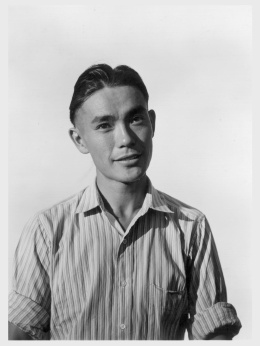 Media
Media
